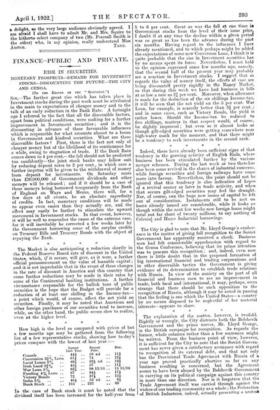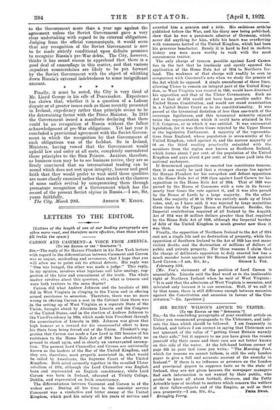FINANCE—PUBLIC AND PRIVATE.
RISE IN SECURITIES.
MONETARY PROSPECTS—DEMAND FOR INVESTMENT STOCKS—DISCOUNTING THE FUTURE—THE CITY AND GENOA.
IT° THE EDITOR OV THE " SPECTATOE."3
SIR,—The further great rise which has taken place in Investment stocks during the past week must be attributed in the main to expectations of cheaper money and to the talk of an early reduction in the Bank Rate. A fortnight ago I referred to the fact that all the discernible factors, apart from political conditions, were making for a further improvement in Investment securities ; and it is the discounting in advance of these favourable influences which is responsible for what amounts almost to a boom in Government and kindred securities. What are these discernible factors ? First, there is the fact not only of cheaper money but of the likelihood of its continuance for a while, owing to stagnation of trade. If the Bank Rate comes down to 4 per cent.—the fall should not be predicted too confidently—the joint stock banks may follow suit by reducing deposit rates to 2 per cent., in which case a further impetus will be given to the withdrawal of money from deposit for investments. On Saturday more than £30,000,000 of Government dividends and other moneys will be released ; and if it should be a case of these moneys being borrowed temporarily from the Bank of England on Ways and Means, there will, for a few days at all events, be an absolute superfluity of credits. In fact, monetary conditions will be made to appear even easier than they actually are, and the effect may easily be further to stimulate the upward movement in Investment stocks. In that event, however, it will be well to remember the cause of the extreme ease, for it will inevitably be corrected a few weeks later by the Government borrowing some of the surplus credits on TreaSury Bills and Treasury Bonds with the object of repaying the Bank.
* * * * The Market is also anticipating a reduction shortly in the Federal Reserve Board rate of discount in the United -States, which, if it occurs, will give, as it were, a further official pronouncement on the value of loanable capital ; and it is not improbable that in the event of these changes in the rate of discount in America and this country that some further reductions may be made in their rates by some of the Continental banking institutions. A further circumstance responsible for the bullish tone of public securities is the hope that the Budget will provide for a -reduction of at least one shilling in the Income-tax— a point which would, of course, affect the net yield on securities. Finally, it may be noted that American and other foreign purchases of our securities tend to increase, while, on the other hand, the public seems slow to realize, even at the higher level.
* * * * How high is the level as compared with prices of but a few months ago may be gathered from the following list of a few representative stocks, showing how to-day's prices compare with the lowest of last year :- Lowest
Last Year. Present Price. Rise.
Consols 441 .. 56 xcl .. 114 Conversion 31% Loan 614 .. 74 .. 124
Local Loans 30/0 ..
494 .. 63} xd 134 Irish Land 24% .. 45} .. 57 114 War Loan 5% .. 824 .. 98 13/16 .. 15 15/16 Funding 4% Loan .. 67 .. 844 .. 174 Victory Bonds .. 72 .. 874 ..
154.
India 3% .. 464 .. 53 xd 64 Rank Stock .. 164 .. 233 69
In the case of Bank stock it must be noted that the dividend itself has been increased for the half-year from 5 to 6 per cent. Great as was the fall at one time is Government stocks from the level of their issue price, I doubt if at any time the decline within a given period was so great as has been the advance during the past six months. Having regard to the influences I have already mentioned, and to which perhaps might be added the expectations of some new Conversion Loan, I think it is quite probable that the rise in Investment securities has by no means spent its force. Nevertheless, I must hold to the opinion expressed some few months ago, namely, that the second half of the present year may probably see a reaction in Investment stocks. I suggest that as regards the value of money itself, the effects of case are being discounteid pretty rapidly in the Money Market., so that during this week we have had business in bills at as low a rate as 21 per cent. Moreover, when allowance is made for the deduction of the six shillings Income-tax, it will be seen that the net yield on the 5 per cent. War Loan, for example, is scarcely better than si per cent; i and in some cases, such as Victory Bonds, the yield is rather lower. Should the Income-tax be reduced to five shillings, matters in that respect would, of course, be slightly improved ; but even so it almost looks as though gilt-edged securities were getting somewhere near high-water mark for the moment, and that there might be a tendency to seek investments in the second rank.
* * * *
Indeed, there have already been sufficient signs of that tendency in the growing activity of English Rails, where business has been stimulated further by the various merger schemes. During the last week or two there has also been some revival in the shares of industrial concerns, while foreign securities and foreign railways have come more into favour. Nevertheless, the point should not be ignored that this tendency is also indicative of hopes of a revival sooner or later in trade activity, and when that occurs gilt-edged securities may feel the draught. Nor, of course, can the huge new issues of capital be left out of consideration. Instalments still to be met on loans already issued are considerable, while it looks as though within the next few weeks new foreign loans might total not far short of twenty millions, to say nothing of Colonial and Home Industrial borrowings.
The City is glad to note that Mr. Lloyd George's exuber- ance in the matter of giving full recognition to the Soviet Government has apparently received a check. Business men had felt considerable apprehension with regard to the Genoa Conference, believing that its prime intention was to procure this recognition ; and, indeed, even now there is little doubt that in the proposed formation of big international financial and trading corporations and in other discernible tactics the Government is giving evidence of its determination to establish trade relations with Russia. In view of the anxiety on the part of all financial and business men to see an improvement in trade, both local and international, it may, perhaps, seem strange that there should be such opposition to the recognition of Russia, although it may be noted in passing that the feeling is one which the United States—a country by no means disposed to be neglectful of her material interests—appears to share.
* * * *
The explanation of the matter, however, is twofold. Rightly or wrongly, the City distrusts both the Bolshevik Government and the prime mover, Mr. Lloyd George, in the British campaigm for recognition. As regards the former, whole columns rather than a few sentences might be written. From the business point of view, however, it is sufficient for the City to note that the Soviet Govern- ment has never given a satisfactory assurance with regard to recognition of its external debt, and that not only has the Provisional Trade Agreement with Russia of a year ago proved practically abortive so far' as any business resulting is concerned, but the Agreement seems to have been abused by the Bolshevik Government in carrying on its political campaign against this country in more than one direction. Nor is it forgotten that the Trade Agreement itself was carried through against the wishes of our trading community as a whole ; the Federation of British Industries, indeed, actually presenting a protest to the Government more than a year' ago against the agreement unless the Soviet Government gave a very clear undertaking with regard to its external obligations. Judging from the official communiques, it would seem that any recognition of the Soviet Government is now to be made strictly conditional upon definite promises to recognize Russia's pre-War debts. The City, however, thinks it has sound reason to apprehend that there is a good deal of camouflage in this matter, and that various impudent counterclaims are likely to be put forward by the Soviet Government with the object of whittling down Russia's external indebtedness to some insignificant amount.
Finally, it must be noted, the City is very tired of Mr. Lloyd George in his role of Peacemaker. Experience has shown that, whether it is a question of a Labour dispute or of greater issues such as those recently presented in Ireland, expediency rather than principle seems to be .the determining factor with the Prime Minister. In 1918 the Government issued a manifesto declaring that there could be no recognition of Russia without the fullest acknowledgment of pre-War obligations. Yet last year it concluded a provisional agreement with the Soviet Govern- ment in which the recognition by that Government of such obligations was of the feeblest. So in Ireland, Ministers, having vowed that the Government would uphold law and order at all costs, completely surrendered those principles to the Sinn Feiners. Anxious, therefore, as business men may be to see business revive, they are so firmly convinced that no international trading can be sound which does not rest upon integrity, honour and good faith that they would prefer to wait until those qualities are more clearly exercised rather than snatch at the chances of some earlier revival by compromising them through premature recognition of a Government which has the record of the present Soviet regime in Russia.—I am, Sir, yours faithfully,



































 Previous page
Previous page